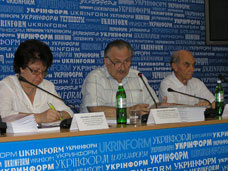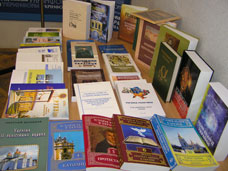Religious Studies Scholars Described the Latest Tendencies in Studying Religious Life in Ukraine

![]()
 “The religious studies field in Ukraine has long been following the universal model, and not the Soviet one,” declared religious studies experts on August 3, 2010, at a press conference at Ukrinform, informs RISU’s correspondent Oleksandr Boiko. In the press conference took part scholars from the faculty of religious studies of the Institute of Philosophy: Anatolii Kolodnyi, Liudmyla Filipovych, and Petro Yarotskyi.
“The religious studies field in Ukraine has long been following the universal model, and not the Soviet one,” declared religious studies experts on August 3, 2010, at a press conference at Ukrinform, informs RISU’s correspondent Oleksandr Boiko. In the press conference took part scholars from the faculty of religious studies of the Institute of Philosophy: Anatolii Kolodnyi, Liudmyla Filipovych, and Petro Yarotskyi.
Anatolii Kolodnyi described the work of the religious studies department, which aims to produce works on the current situation not only of new religious trends, but also on religious studies in Ukraine. Kolodnyi described how the scholars do no have the task of suppressing religion or bringing up atheists, as was done during Soviet times.
“The main task is to study religious phenomena, because truth is not religious truth, but the recognition of truth,” stressed Liudmyla Filipovych. For a long time already, since Ukraine’s independence, scientific quality in religious studies has not been founded on scholarly atheism. Today’s principles in scholarly work in the sphere of religion are scholarly objectivity, super-denominationalism, pluralism, and humanism.
Kolodnyj also commented on how certain media, especially media of the churches, have a political leaning in their work. He said the actions of the highest officials of every governmental administration regarding religious organizations were criticized: “Now we take note of how President Yanukovych gives public preference to one denomination, during Yushchenko’s administration we observed his clericalism, is attempt to be a patriarch for Ukraine, overlooking the attention of other denominations. Such actions of any government have been subject of criticism of scholars. The same concern certain denominational media, before saying something about the quality of new religious trends they should research and not be clamorous.”
 Petro Yarotskyi reported on the publication activity of the department to the press: “Our publications are universal in the sense that they are encyclopedias, that is, academic works, and on the other hand, they are references, which can be used by everyone from scholars to journalists whose work deals with religious life in Ukraine.” Among the publications are such extensive works as “The History of Religion in Ukraine” in 10 volumes, “Christianity in Post-Modernist Time,” and works on new religious trends.
Petro Yarotskyi reported on the publication activity of the department to the press: “Our publications are universal in the sense that they are encyclopedias, that is, academic works, and on the other hand, they are references, which can be used by everyone from scholars to journalists whose work deals with religious life in Ukraine.” Among the publications are such extensive works as “The History of Religion in Ukraine” in 10 volumes, “Christianity in Post-Modernist Time,” and works on new religious trends.
There was also a discussion of the law on the freedom of conscience. The participants of the press conference mentioned that there are two approaches in the discussion of this law: the first is keeping the law the same as it was 20 years ago, but making sure the amendments correspond to the constitution and take into account the facts of the current life of the society. The second approach is creating a new law. But, as mentioned in the press conference, the current law was highly praised by specialists from Europe, in particular, from the Venice Commission.
The scholars expressed their opinions on why there is a departure from the traditional churches. The main reason, in the opinion of the experts, is that there is very little attention to social work in the traditional churches, people don’t communicate, it seems to them that they aren’t need by anyone. When looking at new religious trends, a lot of attention is placed on “work with people,” in which traditional churches are not engaged. An interesting fact was shared that most people in the new religious trends are new converts: out of 900 people questioned only 12 had a religious past in a traditional church.









